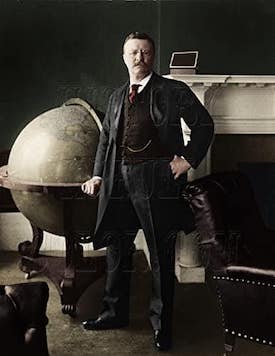“Training a boy to manhood requires them to attain knowledge and courage”. ~ Theodore Roosevelt
 We all saw horrifying images and heard heartbreaking stories about the devastation wrought by Hurricane Helene. But chances are you also heard a few stories of hope, of people lending a hand to those in need. I heard one of these a few days after the storm, compliments of some friends living in the area.
We all saw horrifying images and heard heartbreaking stories about the devastation wrought by Hurricane Helene. But chances are you also heard a few stories of hope, of people lending a hand to those in need. I heard one of these a few days after the storm, compliments of some friends living in the area.
Although their home was high enough to avoid getting swept away in the deluge, my friends were cut off from the outside world for a few days as a nearby creek became a raging river. While waiting to evacuate, the family’s two early- to mid-teenage sons heard screams coming through their window one night while reading before bedtime. When they couldn’t find their father – who was, unbeknownst to them, trying to get some news from the outside world on the car radio – they took matters into their own hands, grabbing some equipment and heading out to the creek, where they rescued their neighbor from debris and a partially submerged car.
Many of those who heard this story couldn’t help but comment on how these boys became men overnight. And in a world where masculinity is regularly labeled as “toxic,” seeing such positive masculine traits of courage and protection ignite in two young people is downright refreshing. The question is, how do we get more of our young men to behave in the same way?
The answer is good training.
“No one can be a good American unless he is a good citizen, and every boy ought to train himself so that as a man he will be able to do his full duty to the community,” Teddy Roosevelt wrote in a 1911 letter to James West, then-executive secretary of the Boy Scouts of America.
Roosevelt went on to offer some tips on raising healthy American men, the fruition of which can incidentally be seen in the lives of my young friends who rescued their neighbor in that fateful storm.
Read, Read, Read!
For starters, consider what these boys were doing when they first heard the screams. They weren’t on electronic devices, nor were their ears plugged with earbuds, indulging themselves with the eye candy of the internet; instead, they were reading books. One could chalk that fact up to the lack of electricity, but I happen to know that these boys were raised in a home where reading was modeled and encouraged regularly.
Why does this matter? Because, as Roosevelt said, training a boy to manhood requires them to attain knowledge and courage.
“To be helpless, self-indulgent, or wasteful, will turn the boy into a mighty poor kind of a man, just as the indulgence in such vices by the men of a nation means the ruin of a nation,” Roosevelt wrote. “Let the boy remember also that in addition to courage, unselfishness, and fair dealing, he must have efficiency, he must have knowledge, he must cultivate a sound body and a good mind, and train himself so that he can act with quick decision in any crisis that may arise.”
Can we use our electronic devices to build our knowledge? Well, yes, but how often do we do so? Adults and children alike are more prone to use them as self-indulgent time wasters.
Reading books, on the other hand, is far more likely to cultivate the good mind and reasoning capabilities for which Roosevelt advocated. And books are also far more likely to advance strong and courageous role models for boys to follow – role models that encourage them toward caring, protective, and hard-working attitudes, rather than ones that encourage the sex, drugs, and abuse that many of today’s celebrities advance.
Teach Solid Morals
 Which brings us to another of Roosevelt’s recommendations, namely, teaching solid morals to young boys:
Which brings us to another of Roosevelt’s recommendations, namely, teaching solid morals to young boys:
“No man is a good citizen unless he so acts as to show that he actually uses the Ten Commandments, and translates the Golden Rule into his life conduct – and I don’t mean by this in exceptional cases under spectacular circumstances, but I mean applying the Ten Commandments and the Golden Rule in the ordinary affairs of every-day life.”
The boys in the above story acted quickly and put their own lives at risk because they were instilled at a young age with the knowledge and understanding that human life is precious simply because humans are made in God’s image. This moral training was on display even while cut off from the rest of the world, for before evacuating their home, the family gathered for a Sunday morning service, including prayers, hymns, and discussion of a catechism question.
The New York Times recently indicated that many young Gen Z men are returning to church and religious practices in far larger numbers than young women. That’s at least a step in the right direction, because when young men have a strong moral compass, it comes through in their personal lives and their outward facing actions. That trickle-down effect can’t help but influence our nation to further kindness and right ways of living – something that practically all of us see a dire need for amid the chaos that is our current culture.
Train Physically
Finally, Roosevelt told us that raising a young boy to be a solid man requires physical training.
“Mind, eye, muscle, all must be trained so that the boy can master himself, and thereby learn to master his fate,” he wrote.
Once upon a time, such physical training wasn’t that hard to achieve, for it was part and parcel of normal life, especially in the agrarian society that once was America. Now, however, Americans are removed from the outdoors and natural physical activity.
I happen to know that the young men in my story were not strangers to the great outdoors, however. Through the years, they’ve often helped with chores at the neighboring farm, and just recently, they set off on a wilderness hike with other boys their age. Who is to say that the skills they learned through these experiences weren’t a key component of why they were willing to take a risk and use their physical energy to rescue a friend in need?
Roosevelt was a historical figure who took masculinity seriously – in his own life and in the lives of his sons and other young men – advocating for strength in not only a physical fashion, but in a mental and spiritual one as well. The parents of my young friends who weathered Hurricane Helene took a page from Roosevelt’s book when raising them, and the dividends are already yielding a healthy return. Perhaps it’s time the rest of us did the same.
Special thanks to Adam and Ruth for once again providing good fodder for my articles!
Written by Annie Holmquist for Annie Holmquist Substack ~ December 17, 2024
~ The Author ~
 Annie Holmquist is a cultural commentator hailing from America’s heartland who loves classic books, architecture, music, and values. Annie was a longtime contributor to Intellectual Takeout.
Annie Holmquist is a cultural commentator hailing from America’s heartland who loves classic books, architecture, music, and values. Annie was a longtime contributor to Intellectual Takeout.
Annie received a B.A. in Biblical Studies from the University of Northwestern-St. Paul. She also brings 20+ years of experience as a music educator and a volunteer teacher – particularly with inner city children – to the table in her research and writing and is a cultural commentator hailing from America’s heartland who loves classic books, architecture, music, and values.
